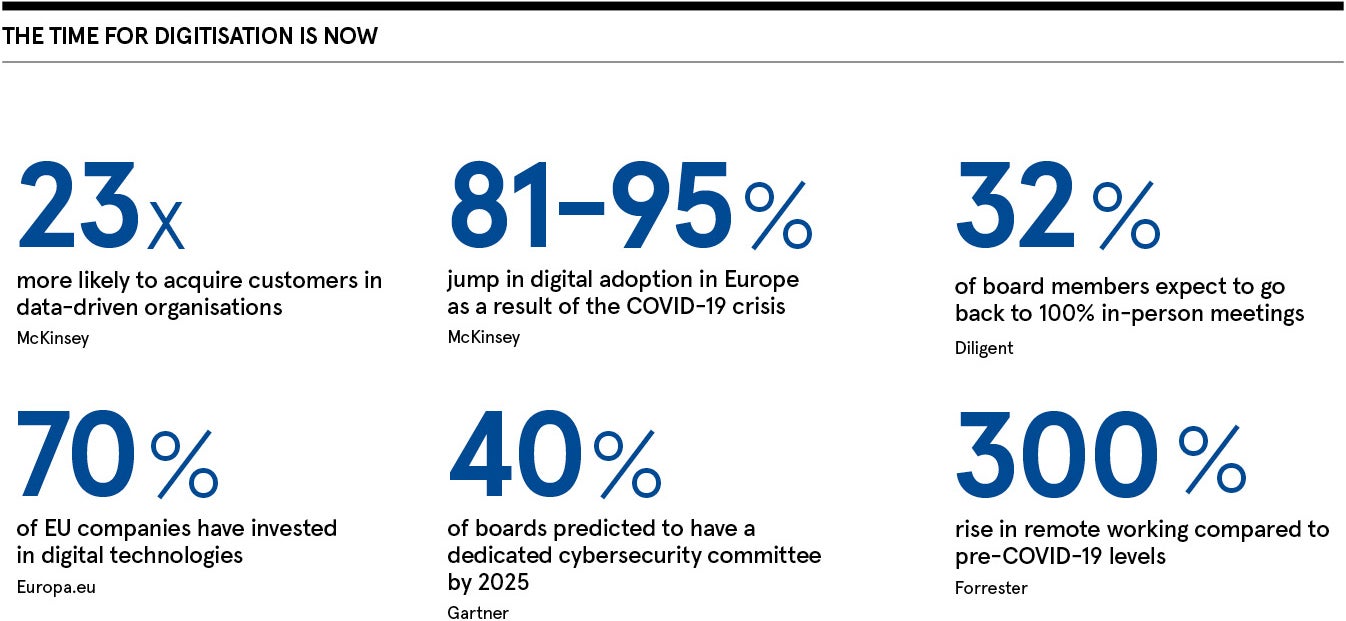
Governance is not an area of business that has been historically associated with digital transformation. Formed predominantly of two very traditional functions, boards of directors and legal departments, it certainly has not been what companies first turn to when they embark on digitalisation programmes.
Coronavirus has been a driving force for change, however. As a major accelerator of digital transformation across organisations, the pandemic has forced board directors and legal professionals to work remotely, relying entirely on digital tools to carry out their duties.
Meanwhile, an amplified environmental, social and corporate governance (ESG) agenda, flared up by an uprising of social injustice issues, has disrupted boardrooms further, in some instances shining a light on a lack of diversity. And with everybody working from home, an evolving digital threat landscape has elevated another potentially critical issue of cyberattacks. All this has increased the pace of board activity as well as the need for the right technology to manage it.
“Through 2020 and into 2021, there has been a massive increase in workload for board members,” says Brian Stafford, Chief Executive Officer at Diligent, a leading modern governance software provider. “Anytime there is a crisis, the pace of activity accelerates dramatically and, if you combine that with the increasingly important backdrop of diversity, the need for more cybersecurity tools and the major shift toward stakeholder capitalism, boards have had a huge amount to oversee.”
Interactions between the board and management, and sometimes shareholders and regulators, may be the most visible part of governance, but they only account for about 10 per cent of what board members do. The other 90 per cent lives below the surface. While critical to company performance, such activities are rarely observed or addressed, which can result in governance gaps that form an incomplete picture of the business.
Filling these gaps should be a business priority. Having a more holistic view of an organisation and acknowledging the impact a company has on its shareholders, customers, suppliers, employees and communities – or stakeholder capitalism – ultimately leads to higher-performing businesses.

This calls for a more modern approach to governance to reflect the circumstances of businesses today. Modern governance is the evolution of leadership, board and operational practices to drive sustainable performance, investor confidence, stakeholder engagement and lasting impact, all powered by the right technology and insights. It is the key to the next frontier of digital transformation and to unlock it organisations need to digitalise their governance practice with a platform that combines technology, insights and processes.
“Traditional governance was something that happened four times a year in smoke-filled mahogany conference rooms, largely with a non-diverse group of individuals. That can no longer be the norm,” says Stafford. “Modern governance provides more transparency, diversity and frequency of insight, communication and connectivity, providing boards and leadership teams with more information to make the right decisions.
“As a result, management gets a more diverse set of perspectives for long-term success, including seeing crises further in advance. Modern governance takes information wherever it exists, whether that is inside or outside a company, and ensures the board of directors and leadership can ask the right questions and make the right decisions at the right time.”
Modern governance takes information wherever it exists, and ensures the board of directors and leadership can ask the right questions and make the right decisions at the right time
As a pioneer of modern governance, Diligent powers its solutions through a platform that brings together disparate tools, data, integrations and processes into one place so board leaders can effectively govern at today’s fast pace of business. The platform is comprised of three solutions: board and leadership collaboration, operational governance, and advanced governance analytics.
Through any device, board and C-suite members can access the Modern Governance Platform to connect to relevant information and insights that help them fulfil their role. This could be presentations and documents, or data and intelligence about competitors and the wider industry, all curated by Diligent’s team and trusted third parties.
As the largest global network of corporate directors and executives, Diligent is relied on by more than 19,000 organisations and 700,000 leaders in over 90 countries. Its platform empowers leaders to turn governance into a competitive advantage, thereby enabling them to thrive in a complex business landscape. It also enables digital transformation to start at the very top of organisations, which is where such programmes are most likely to succeed, and then cascade down throughout the rest of the business.
“What we find with the most successful companies is digital transformation starts at the top and what better proof point to show than your C-suite leading the charge and embracing the latest technology and software,” says Stafford. “Starting with a few wins and showing how you drove digital transformation among the most senior directors is hugely valuable for the rest of the company. Having that come from executive role models is empowering.
“Governance responsibilities and processes will continue to accelerate in the years ahead, along with further pressure from regulators and activist investors and the rapidly evolving ESG landscape.
“To effectively manage the changing dynamics in an organisation, leaders need more information at a more frequent cadence. The role of the board member is not something that just happens four times a year. It is an ongoing monthly, if not weekly, role because people have to be more prepared and up to date on company and wider industry insights to be good stewards of the organisations whose boards they sit on.”
For more information please visit diligent.com


Governance is not an area of business that has been historically associated with digital transformation. Formed predominantly of two very traditional functions, boards of directors and legal departments, it certainly has not been what companies first turn to when they embark on digitalisation programmes.
Coronavirus has been a driving force for change, however. As a major accelerator of digital transformation across organisations, the pandemic has forced board directors and legal professionals to work remotely, relying entirely on digital tools to carry out their duties.
Meanwhile, an amplified environmental, social and corporate governance (ESG) agenda, flared up by an uprising of social injustice issues, has disrupted boardrooms further, in some instances shining a light on a lack of diversity. And with everybody working from home, an evolving digital threat landscape has elevated another potentially critical issue of cyberattacks. All this has increased the pace of board activity as well as the need for the right technology to manage it.

